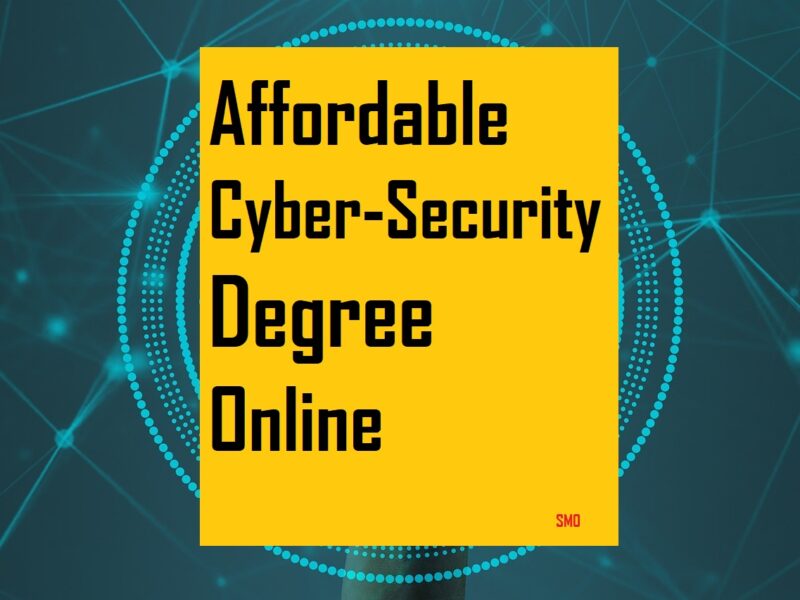As cyber threats grow more advanced, the global demand for cyber security professionals continues to surge. According to the U.S. Bureau of Labor Statistics, jobs in information security are projected to grow by 32% by 2032, making it one of the fastest-growing tech sectors.
If you’re interested in entering this high-paying, high-demand field without piling up debt, then an affordable cyber security degree online is your gateway to success.
This guide covers:
- Top affordable accredited cyber security degree programs
- Tuition costs and financial aid options
- Career paths and salary expectations
- How to apply and what to expect
Why Choose an Online Cyber Security Degree?
Flexibility:
Study at your own pace, often while working full-time.
Affordability:
Avoid campus housing costs, commuting, and fees.
Accessibility:
Get a quality degree regardless of your location.
Certification Readiness:
Most programs prepare students for top certifications like:
- CompTIA Security+
- Certified Ethical Hacker (CEH)
- CISSP (for advanced learners)
Best Affordable Online Cyber Security Degree Programs (2025)
| School | Accreditation | Tuition (Estimated) | Degree Type | Key Features |
| Western Governors University (WGU) | NWCCU | $3,625/term | B.S. Cybersecurity | Self-paced, certs included |
| University of the People | DEAC | $0 Tuition, $120/exam | B.S. Computer Science | Tuition-free model |
| Fort Hays State University | HLC | $226/credit | B.S. in Cybersecurity | Hands-on labs |
| Southern New Hampshire University (SNHU) | NECHE | $330/credit | B.S. Cyber Security | 24/7 support, flexible |
| Bellevue University | HLC | $440/credit | B.S. Cybersecurity | Transfer-friendly |
| Kennesaw State University (eMajor) | SACSCOC | $199/credit | B.S. in Cybersecurity | State-funded tuition |
All of these programs are accredited, financial aid eligible, and offer online flexibility for busy learners.
Typical Coursework in Cybersecurity Degrees
Core classes often include:
- Introduction to Information Security
- Network Defense & Security
- Ethical Hacking
- Cyber Forensics
- Cryptography
- Risk Management
- Security Policy & Governance
- Cloud Computing Security
Programs may include capstone projects, internships, or simulation labs.
Admission Requirements
While specifics vary by school, most require:
| Requirement | Details |
| High School Diploma or GED | Mandatory |
| GPA | 2.0+ (varies) |
| SAT/ACT Scores | Often waived for online |
| English Proficiency | For international students |
| Transcripts | From all prior institutions |
Some programs offer credit for prior learning or certifications.
Tuition Comparison
| University | Cost Per Credit | Total Tuition (Approx.) |
| WGU | Flat rate ($3,625/term) | ~$14,500 (2 years) |
| SNHU | $330 | ~$39,600 (120 credits) |
| Fort Hays State | $226 | ~$27,120 |
| UoPeople | $0 tuition, ~$4,800 total (40 exams) | |
| Kennesaw State | $199 | ~$23,880 |
| Bellevue University | $440 | ~$52,800 |
Many schools offer transfer credit, scholarships, and military tuition discounts.
Financial Aid Options
Yes, these online cyber security programs accept:
- FAFSA (Free Application for Federal Student Aid)
- Pell Grants (if eligible)
- Federal Direct Loans
- Scholarships (institutional or external)
- Veterans benefits (GI Bill, Yellow Ribbon Program)
- Employer tuition reimbursement
Always apply early for aid and review your Student Aid Report (SAR) thoroughly.
Career Paths and Salaries
Graduating with a cyber security degree opens doors to several well-paying roles:
| Job Title | Average Salary (U.S.) |
| Information Security Analyst | $112,000 |
| Network Security Engineer | $105,000 |
| Ethical Hacker / Pen Tester | $102,000 |
| Cybersecurity Consultant | $120,000 |
| Chief Information Security Officer (CISO) | $160,000+ |
| Cyber Threat Analyst | $98,000 |
Cybersecurity roles are expected to remain recession-proof due to rising digital threats.
Key Certifications to Boost Your Career
While not always mandatory, these certifications greatly increase employability:
- CompTIA Security+ – Foundational
- Certified Ethical Hacker (CEH) – Offensive security
- Certified Information Systems Security Professional (CISSP) – Advanced leadership
- Certified Information Security Manager (CISM) – Risk and governance
- AWS Security Specialization – For cloud-based security roles
Many programs include vouchers or prep for these certs in the curriculum.
How to Apply to Online Cyber Security Programs
Step 1: Research and Compare
Compare tuition, accreditation, and course delivery.
Step 2: Prepare Required Documents
Include transcripts, identification, and application essays (if needed).
Step 3: Submit FAFSA
Complete your application at studentaid.gov for financial aid.
Step 4: Apply to the Program
Most schools offer online applications with no test scores required.
Step 5: Register and Begin
Once accepted, meet with an advisor to plan your course schedule.
Benefits of an Online Cyber Security Degree
- Fully remote learning for global access
- Fast-track career growth in a booming industry
- Immediate application of skills to real-world scenarios
- Lower tuition rates and reduced indirect costs
- Qualify for high-paying roles with minimal investment
Common Pitfalls to Avoid
- Choosing unaccredited or for-profit-only institutions
- Ignoring certification readiness in the curriculum
- Failing to apply for scholarships or FAFSA
- Overlooking transfer credit opportunities
- Skipping cybersecurity internships or lab simulations
Tip: Ensure the program has career services and resume support to help you land jobs faster.
FAQs – Affordable Cyber Security Degrees Online
Q1: Are online cyber security degrees respected by employers?
Yes—especially when the program is regionally accredited and includes industry certification prep.
Q2: Can I work full-time while studying?
Absolutely. Most affordable programs are designed for working adults and offer asynchronous classes.
Q3: Is financial aid available for online students?
Yes. All federally accredited schools offer FAFSA-based aid to eligible students.
Q4: What’s the fastest online cyber degree program?
Western Governors University (WGU) offers self-paced, competency-based programs that allow you to graduate in as little as 18 months.
Q5: Do I need a tech background to enroll?
No. Many programs are beginner-friendly and teach foundational IT and security concepts from scratch.
Launch Your Cyber Career Without Breaking the Bank
In an increasingly digital world, cyber security is not just a trend—it’s a necessity. Whether you’re switching careers, upskilling, or starting from scratch, an affordable online cyber security degree offers flexibility, value, and job readiness.
By choosing the right program, applying for aid, and focusing on certifications, you can start a lucrative and meaningful career—all while studying from the comfort of your home.
Don’t wait—apply today and become the cyber protector of tomorrow.










